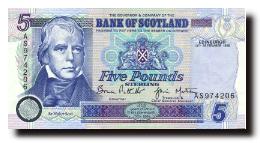Off to Scotland
So I'm making a flying visit to Scotland tomorrow to remind a University why Lotus Notes is the collaborative solution of choice.
But unusually for me, I do have a critisism of Notes - or more specifically Scottish bank notes. To put it plainly, they are rubbish.

Whilst Scottish folks are perfectly happy to accept English notes in Scotland, you trying spending Scottish notes in England. More specifically in South West London. Last time I presented one in my local pub the landlord said he would normally not accept them because as far as he is concerned, "they may as well be Monopoly money". In fairness to him he did accept it due to my honest face and fine standing in the community (or more likely because he knew where I lived if it was forged). I'm saving trying to spend real Monopoly money there until I'm really desperate.
Anyway - the point is that now 12 European countries, with numerous languages and cultures, can share a single set of transferable bank notes with no problems. Yet we can't sort it out with our next door neighbour in what is officially the same country. Perhaps not such a United Kingdom?
But unusually for me, I do have a critisism of Notes - or more specifically Scottish bank notes. To put it plainly, they are rubbish.

Whilst Scottish folks are perfectly happy to accept English notes in Scotland, you trying spending Scottish notes in England. More specifically in South West London. Last time I presented one in my local pub the landlord said he would normally not accept them because as far as he is concerned, "they may as well be Monopoly money". In fairness to him he did accept it due to my honest face and fine standing in the community (or more likely because he knew where I lived if it was forged). I'm saving trying to spend real Monopoly money there until I'm really desperate.
Anyway - the point is that now 12 European countries, with numerous languages and cultures, can share a single set of transferable bank notes with no problems. Yet we can't sort it out with our next door neighbour in what is officially the same country. Perhaps not such a United Kingdom?



Comments
it all stems from a bit of history......
In reality its no different to all of the local banks England & Wales had in the 18th & 19th century, most of which combined to form the well known and well loved bankers in our high streets of today.
See here for some examples.... http://www.colin-narbeth.com/cgi-bin/world.cgi?P&L
In most countries it is only the Government, through their central banks, who are permitted to issue currency. But in Scotland three Banks are still allowed to issue banknotes. The first Scottish bank to do this was Bank of Scotland. When the bank was founded on 17th July 1695 through an Act of the Scottish Parliament, Scots coinage was in short supply and of uncertain value compared with the English, Dutch, Flemish or French coin, which were preferred by the majority of Scots. The growth of trade was severely hampered by this lack of an adequate currency and the merchants of the day, seeking a more convenient way of settling accounts, were amongst the strongest supporters of an alternative.
Bank of Scotland was the first Joint-Stock company in Europe which was not Government sponsored and was granted a monopoly over banking within Scotland for 21 years. Immediately after opening in 1695 the Bank expanded on the coinage system by introducing paper currency. This idea was first viewed with some suspicion. However, once it became apparent that the Bank could honour its "promise to pay" and that the paper was more convenient than coin, acceptance spread rapidly and the circulation of notes increased. As this spread from the merchants to the rest of the population, Scotland became one of the first countries to use a paper currency from choice - try telling that to your landlord!
The bad news - There are more Royal Bank banknotes circulating in Scotland than those of any other bank but, with the exception of temporary provisions during both World Wars, Scottish banknotes have never been ‘legal tender’ even in Scotland. Today, no banknote qualifies as ‘legal tender’ north of the Border, although they remain legal currency. The notes may also circulate freely in England and Wales, although branches of the Royal Bank there may not issue them. So they are not even "legal tender" in Scotland - even more good news for your landlord!!!